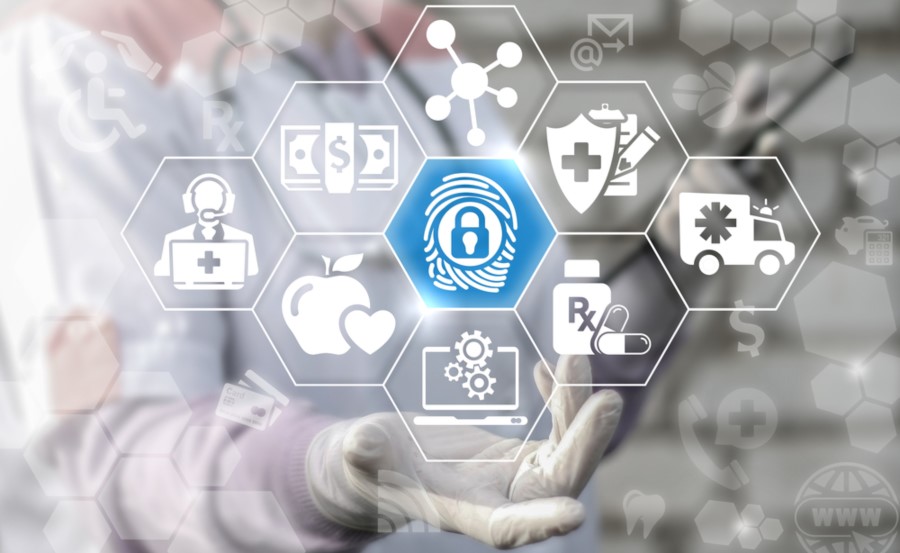How the use of biometrics is causing healthcare to evolve

What is biometric data?
This refers to information taken using unique measurements from your body, such as your fingerprints, the irises of your eyes, your voice or even your veins. If you have a phone that you unlock by a touch of the screen, or you own a Fitbit or other fitness tracker, then you’re using biometric data every day.
Modern form for old concept
While this may seem like something new, it’s actually just a modern form of something that societies have been doing for quite a long time. One of the first uses of biometrics for systematic identity management occurred in 1858, when a savvy civil servant in India recorded his employees’ handprints on the back of their contracts for use in potential pay disputes.
For more than 100 years, law enforcement agencies have been using fingerprint identification of crime suspects, with DNA sampling coming along in more recent years. If you live in the UK, you can even track what biometric data police departments have on you.
Using biometrics to prevent fraud
When it comes to your health, biometric data can provide a wealth of valuable insight. It can ensure that medical records contain your information and no one else’s to help prevent fraud. America’s National Health Care Anti-Fraud Association estimates that health care fraud runs into the tens of billions of dollars every year. Linking data through iris scanners or facial recognition software is already being used to prevent ‘overlays’ — when someone else’s information is linked to yours, potentially fraudulently.
Fitness trackers, apps and your health
The ability for your biometric data to be collected and monitored means foreseeable health issues might be prevented or caught early. Many people are already recording their blood pressure, sleep patterns and heart rates through fitness trackers. These body-worn devices are proving successful at detecting health concerns such as irregular heartbeats. For instance, a UK student’s life was saved after she flagged an abnormal heart rate reading from her fitness tracker to a telephone health care service.
Plenty of apps can also remotely monitor your health through information you can input, such as your temperature and oxygen levels. Add in scanning your veins or eyes to check for hidden diseases, and it means you could be linked to a clinician quickly – in some cases even faster than the typical time it takes to book an appointment. Biometric data can also alert your doctor to health concerns you’re not aware of, catching problems before time passes and before symptoms that might cause you to seek medical advice arise.
Some biometric hardware can even detect data through clothes. Sensor manufacturer Olea has developed a system that collects real-time heart rate respiration and heart rate variability, then transfers the data to a central processing unit through a USB cable or Bluetooth wireless system. Convenient, portable technologies like this can help solve the problem of access to quality care by homebound older and disabled people, as well as those living in developing countries and remote areas.
Increasing global technology access
The number of people throughout the world with mobile phones and internet access continues to grow. According to the Spring 2015 Global Attitudes Survey from the Pew Research Centre, the median percentage of people living in 21 emerging and developing countries who reported owning a smartphone or using the internet at least occasionally rose from 45 per cent to 54 per cent in just two years.
With smartphone use comes apps – many of which already offer some form of biometric tracking. Academic research, Health App Use Among US Mobile Phone Owners: A National Survey (2015), found that 58 per cent of mobile phone users had downloaded at least one health care app.
Usability and privacy issues
Use of biometric data doesn’t exist without concerns, though. In the same academic research, more than 45 per cent of all respondents who had downloaded health care apps stopped using them, either because they were bored with inputting their personal data or worried about their privacy in doing so.
Questions have been understandably raised about data protection. For example, would stored biometric information ever be accessed or requested by people such as future employers? Could they require the recording of that data as a condition of employment?
Today’s digital service providers, healthcare companies and related organisations are working hard to address those issues by adopting cutting-edge practices for safeguarding data. Moving forward into this evolving market, they must balance the need for data protection with the goal of improving access to quality healthcare through technology.
This article was provided by Aetna.
Supplied by REBA Associate Member, Aetna
Aetna is re-shaping and improving health care across the globe by developing solutions.







